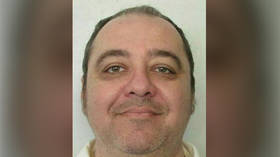Alabama schedules first execution with novel method

The state of Alabama asked a court on Friday to schedule the execution of convicted killer Kenneth Eugene Smith via the novel method of nitrogen hypoxia.
Attorney General Steve Marshall requested that the Alabama Supreme Court set a date for what would be the second attempt to execute Smith, who was convicted in 1988 of killing a preacher’s wife in a murder-for-hire scheme masterminded by the preacher himself.
A previous attempt to execute Smith via lethal injection failed last year when the technicians were unable to insert the IV tube to deliver the deadly drug cocktail.
Nitrogen hypoxia has never before been used as an execution method, though Alabama, Oklahoma and Mississippi have all legalized it. Nitrogen comprises 78% of the air humans already breathe, and increasing this to 100% would – at least theoretically – leave the prisoner unconscious within a minute and dead soon after.
“Its failure rate, that is, cases in which the prisoner survives, would likely be much lower than what we see with current death penalty methods,” Professor Charles Blanke of Oregon Health and Science University School of Medicine told Fox News.
The state has not released details on how it plans to execute Smith, such as whether a gas chamber or a specially-designed gas mask will be used, and the lack of planning or precedent has raised alarms among prisoners’ advocates.
“Alabama is in no position to experiment with a completely unproven and unused method for executing someone,” attorney Angie Setzer of the Equal Justice Initiative told the Associated Press.
Smith and his partner were paid just $1,000 each in 1988 to stage a fake home invasion at the residence of Charles and Elizabeth Sennett in Colbert County. Elizabeth was bludgeoned with a fireplace tool and stabbed nine times. Her husband, a Church of Christ pastor, allegedly hoped to cash in on the high-value life insurance policy he had taken out on her as he had racked up significant debts.
Sennett committed suicide a week after the murder, though not before confessing to his sons that he had been having an affair and was responsible for their mother’s death.
Botched lethal injections are not uncommon in the US – Smith’s was the second in just two months in Alabama and its third since 2018. The main drugs once used in the process are no longer produced domestically and are illegal to import for purposes of execution, leaving states to improvise with occasionally disastrous results.
The grisly spectacle of botched lethal injections has apparently made the idea of nitrogen hypoxia popular even among death row inmates. At least eight prisoners in Alabama have sued to be killed this way since the method became legal in 2018.













